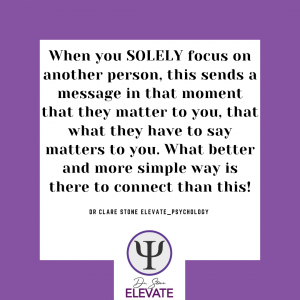Are you as connected as you think?
Loneliness and the importance of connection
Funny enough this topic has come up in a number of different contexts for me in the past week. Clients are speaking about increased feelings of loneliness, I notice it in the people around me in my own life, and to some extent I have been reflecting on my own experiences of loneliness.
What Exactly is Loneliness?
I want to be clear about something before I start on this topic. Loneliness is not the absence of having people around us, although this can contribute to it. Far from it. An individual can be surrounded by people most of their day, and appear on the surface to have a good social network and communication. BUT feelings of loneliness can still occur despite this. Why? It’s simple. Feeling lonely is not just about being alone; it is the result of not feeling CONNECTED to others. Connection is not measured by how much you speak to, or spend time with a person, but by the quality of the interaction and engagement with one another.
Don’t get me wrong, loneliness can of course occur from being on your own. For example I have concerns about people who live on their own, and the elderly in particular in current circumstances. Never in our recent history have we been told to stay away from each other, don’t hug or kiss, don’t hold hands, and sending the general message that other people could be potentially dangerous due to the possibility of carrying a virus. The impact of the pandemic and social distancing rules means that people are most likely feeling increasingly isolated. We can call, or visit from gardens, or doorways, but how is the quality of the connection? I know I am not alone in saying that it is just not the same.
My observations of Loneliness
If I share a personal perspective on this one. I have found that if I cannot get the ‘real deal’ of being around people, then I can become avoidant of people in general. When I spend some time reflecting on why this is, I can recognise that it is simply because it hurts not to be able to connect with people in a way that feels so natural and instinctual to me. I miss it so much. So the avoidance of being around people temporarily helps avoid this pain in the first place. It is however a short-term measure. Although it makes sense, much like most other forms of avoidance, it is unhelpful. It could even become damaging if left unchecked.
It can also be the case that when we have many competing demands to deal with, or at times when we are struggling, is when we tend to unconsciously block people out. We convince ourselves that we don’t have the time for social engagements, or we can’t be bothered because we are so tired. Perhaps you feel the need to hide, even from the people who love and care for you, because it feels safer to close yourself away than risk exposing those parts which are just too raw. Some of us have historical hurts from exposing our vulnerabilities, so we learn to keep people at a distance during those most difficult times. The P!nk song comes to mind here ‘Leave me Alone, I’m Lonely’. Conversely it is at those times that we most need social support.
The Way Forward
So what do we do about all this then? Well as I said near the beginning of this article, loneliness is not just about feeling alone, but about lack of connection. I would suggest that the first step is to start reaching out more, and arranging meet ups (even virtual ones) where you can connect to others. Try and pay attention to how connected you feel, and increase this connection where needed by talking about things which really matter to you, not just the superficial stuff. Remember you don’t always need to present a ‘got it all together’ image, and learn who you can trust to talk to when you are finding things difficult.
As a family member, colleague or friend you can also consider some points here for spotting someone who is feeling lonely. It can be exceptionally hard for someone who feels disconnected to reach out, and so having someone in their life who spots this and opens the door for them to share can make all the difference. When you ask how a friend is doing for example, don’t just accept the initial automatic answer ‘fine’. Probe a bit deeper, ask follow up questions, show an interest, actively listen to try and understand, and reflect back your empathic understanding of what is going on for them. You don’t necessarily need to solve their problems for them, or come up with resolutions. Mostly people just need to feel heard and understood. We feel more connected when it is perceived that the person talking to us cares, and is genuinely interested in what we have to say. Even if the person doesn’t feel able to open up at the time, you have at least laid some groundwork for a closer connection.
One last thing ……
When you are spending time with someone, whether it is a partner, family member, colleague, or friend, give them your full undivided attention. Switch that TV off, put your phone away, minimise distractions. Yes I know we are all guilty of half watching the TV, or playing with our phones when around others. But when you solely focus on that other person, this sends a message in that moment that they matter to you, that what they have to say matters to you. What better and more simple way is there to connect than this!

